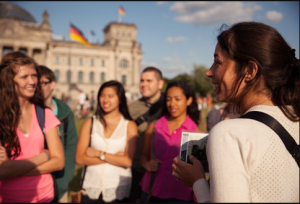
Traveling is more than just exploring new places—it’s a transformative experience that shapes your perspective, builds resilience, and fosters personal growth. For students applying for scholarships, these experiences can be a goldmine of unique stories and insights that set you apart from other applicants. In this blog post, we’ll explore how to effectively leverage your travel experiences in scholarship applications to boost your chances of success.
Why Travel Experiences Matter in Scholarship Applications
Scholarship committees are looking for candidates who stand out. They want to see individuals who have gone beyond the classroom to gain real-world experiences, develop unique skills, and demonstrate a global mindset. Traveling often provides these qualities in spades. Whether you’ve backpacked through Europe, volunteered in a remote village, or studied abroad, your journey can highlight qualities like adaptability, cultural awareness, and problem-solving—traits that scholarship providers value.
1. Reflect on Your Travel Experiences
Before you start writing, take time to reflect on your travels. Ask yourself:
- What challenges did I face, and how did I overcome them?
- How did the experience change my perspective or goals?
- What skills did I develop (e.g., communication, independence, cultural sensitivity)?
For example, if you volunteered in a developing country, you might have learned the importance of resourcefulness and teamwork. If you studied abroad, you may have gained a deeper appreciation for diversity and collaboration. These reflections will form the foundation of your application.
2. Connect Your Travels to Your Goals
Scholarship providers want to know how your experiences align with your academic and career aspirations. Use your travel stories to demonstrate your passion and commitment to your field of study.
For instance, if you’re applying for a scholarship in environmental science, you could highlight a trip where you witnessed the effects of climate change firsthand and how it inspired you to pursue a career in sustainability. By connecting your travels to your goals, you show the committee that you’re not just a dreamer—you’re a doer with a clear vision.
3. Showcase Personal Growth
Travel often pushes us out of our comfort zones, and scholarship committees love to see evidence of personal growth. Share specific anecdotes that illustrate how your travels helped you grow as a person.
Did you navigate a language barrier to make new friends? Did you overcome a fear of heights to hike a mountain? These stories demonstrate resilience, adaptability, and a willingness to embrace challenges—qualities that scholarship providers admire.
4. Highlight Cultural Awareness
In an increasingly interconnected world, cultural awareness is a highly valued skill. Use your travel experiences to show that you’ve developed an understanding and appreciation for different cultures.
For example, you could write about how living with a host family taught you the importance of empathy and open-mindedness, or how participating in a local festival deepened your respect for cultural traditions. These insights can help you stand out as a globally minded candidate.
5. Tailor Your Story to the Scholarship
Every scholarship is unique, so it’s important to tailor your application to the specific opportunity. Research the scholarship’s mission and values and think about how your travel experiences align with them.
think about how your travel experiences align with them.
If the scholarship emphasizes leadership, focus on a time when you took initiative during your travels, such as organizing a group activity or leading a volunteer project. If it values community service, highlight how your travels inspired you to give back to your own community.
6. Write with Authenticity and Passion
Finally, let your passion shine through in your writing. Scholarship committees can tell when an application is genuine. Avoid generic statements and instead, use vivid details to bring your travel experiences to life.
For example, instead of saying, “I learned a lot from my trip,” you could write, “Watching the sunrise over the Himalayas after a grueling two-day trek taught me the value of perseverance and the beauty of pushing my limits.”
Conclusion
Your travel experiences are more than just stamps in your passport—they’re stories of growth, learning, and inspiration. By reflecting on your journeys, connecting them to your goals, and showcasing your unique qualities, you can create a compelling scholarship application that stands out from the crowd.
So, the next time you sit down to write a scholarship essay, don’t underestimate the power of your travel stories. They might just be the key to unlocking your next big opportunity.
